Capturing the Blades: 1989-90
Bill Stephenson was given an access-all-areas pass to document United's successful 89/90 campaign. Now, for the first time, this photo record has been put together in book form
Words: David Taylor
From the minute social documentary photographer Bill Stephenson arrived in Sheffield in 1979, Sheffield United was a major fixture in his life. “I came to Sheffield to study Fine Art, and moved to the bottom of Woodhead Road,” says Stephenson from his home in Buxton. “Before they built the Westfield Health Centre corner stand, I could see the middle of the pitch from my bedroom window. I was able to watch the middle of the games from my window, although I couldn't see either goal!”
Ten years later, Stephenson was a well-established photographer, both artistically and commercially. It made sense that as a young freelancer with geographical ties to the Blades, a BBC crew documenting United’s 89/90 season would look to him for promotional shots. This afforded him unequalled access around the club, to the players, matches and fans. As luck would have it, that season turned out rather well. “It was a fantastically exciting time to be involved with the club,” recalls Stephenson. “They were winning games, the fans were ecstatic, and there was a tremendous following. It was great being around it.”
Now, over 30 years later, a selection of the images taken that year has been put together in a book by Stephenson and football culture curators Lower Block. Charting the highs, temporary lows, and even bigger highs of an unforgettable season, Blades 1989-90 offers a prolonged snapshot of a club suspended in time and glorious technicolour. The Pinch caught up with Stephenson ahead of the book’s launch to find out how he was received by the players, what the fans made of him and why the experience has stayed fresh in his mind after so many years.
The Pinch: How tightly knit did the club feel at the time?
Bill Stephenson: I couldn't help but get the feeling that Blades supporters had a sense of identity and purpose. They were part of a like-minded community of people. It was a great privilege to be part of that.
The players were accessible, and they were great. I remember Paul Stancliffe in particular – what a very unassuming professional person he was. He looked after the other team members and was free to chat about everything.
Did the players enjoy having the photos taken? You were in the dressing rooms, and even in the showers! You must have felt like part of the furniture.
Part of the skill of a photographer is to be fairly unnoticed. But I was a fairly familiar person by then, loitering around the changing rooms and the side of the pitch. I’d socialised with many of them and gone to their houses to photograph them, mainly for women's magazines.
Then the BBC promotion machine kicked into place, and they wanted to get maximum publicity for the six-part series.
It must’ve been useful to have had a previous relationship with some of the players.
They were very happy with the filming that was going on. At that time, it was fairly new to do that kind of documentary, and certainly a football documentary. The Blades were also winning nearly every game. They were on a high, the players were all anticipating going into Division One, and they knew that their careers were going to take off.
Promotion was a double-edged sword. Some of the players such as Paul Stancliffe had been with the club and built up that fantastic team, and then once the Blades got into Division One, they could afford newer players. Paul was in his early 30s, so he was coming to the end of his career, but it was certainly great for him to be in a winning team.
And in a team that will be remembered thanks to the documentary and your photos! You also covered a huge range of fan groups. Were most of the fans pretty welcoming?
Everybody was great. I never had a problem with anyone. Before I take pictures I like to get to know people, so they're much more relaxed and I get a much more naturalistic feel. Even though the pictures were for the BBC, I did try to get that intimacy across from the fans and players.
That intimacy would have been helped along by the depth of access you had.
I just had to make sure I wasn't being filmed. A bit of a drawback through the winter was that the light was poor. This is pre-digital photography, so you're having to make do with the limitations of using film. It’s very tricky to get exposure and colours right.
The black and white shots in the changing rooms and showers are where I had to use high-speed black and white film to capture those. I've had to pixelate some things…
Yes, I was slightly taken aback by certain glimpses…
Yes, I pixelated those pictures! But I wanted to show what it was really like after a game. And after that particular game, when they lost against Manchester United, how disappointed and devastated they were. It was so important, and they couldn't hide their disappointment. They really wanted to beat Manchester United more than anything: not just for the team, but their personal careers. I was glad that I had access to take those pictures.
Did the players ever react negatively to you, especially after a loss?
If I felt that I was intruding, I would back off. Some photographers just keep going until someone tells them to clear off, but I would always be perceptive enough to realise I'd done enough and get out and leave them be.
They were aware of what I was doing and felt confident in what I was doing as well: that they were going to be pictures with some sort of merit at the end of the day.
Harry Bassett was fairly formidable. If anybody restricted my photography, it was probably him, because sometimes he'd be talking to the players and didn't want it recording; he didn't want the film crew in there. You had to grab your chances. He was a little bit unnerving. But a fantastic manager.
I suppose he was the right man at the right time.
Yeah, and there were times when he asked us to leave and was really insulting to the team. If it was halftime and they were playing badly, he was really quite hostile to them. He’d ask the camera to stop filming while he gave them an absolute… I mean, it was full of expletives! His method of geeing up the team wasn’t subtle management, it was insults, hurling abuse at them – which they usually responded to.
One of the photos that sticks out to me is the guy from the Blades Business Crew. That must have been an interesting experience for you.
Oh, yeah, he was OK! Oh yes, they loved having their picture taken. They were wearing their uniform. I described them as hooligans, and they were. Thankfully now, it's not so prominent, but then it was. The visitors were just as bad, each had their groups.
Some people have questioned on social media why I'd taken some pictures of the Blades Business Crew – only a couple [of pictures] – thinking these things should be erased. But I had to put those in.
It's tricky. You obviously don't want to glorify it, but as you say, this is social documentary. You don't want to sanitise what was happening.
Absolutely. And the guys I met were very nice actually [laughs]! That guy loved having his photo taken. They wanted to be photographed in front of a policeman, which is why they’re posturing.
They used to meet at the Sportsman, and that was where Sean Bean and his mates used to be every Saturday for home games too.
Was that before his big break?
It was, but he was certainly a very well-known, up-and-coming actor. He was definitely one of the lads. He enjoyed drinking and being with his football mates. I noticed on social media that loads of people have identified others in the photo. He was a passionate Blades supporter, just one of the lads looking forward to the game, having a few pints before and after. I didn't really notice him that much!
Did you expect to get such a wide range of slices of life while on the project? Did you find yourself becoming a United fan?
It was a great experience. I'm a total Blades fan now, of course. I moved from Sheffield 25 years ago, but every Saturday, I’ll follow them, and have been lamenting their progress lately…
Hopefully next year will be more like 89/90! What’s the most important element of your work?
All these photo documentaries are always concerned with recording the society that we live in today, or at a point in time. As time goes by, pictures like these become historic records. That's why I always try to be quite truthful about everything I do, because people will pick you up on things that you might exaggerate.
I treated this United work as social documentary work and was aware at the time that this would, of course, please the BBC and get lots of publicity for the show, but also hopefully become a record of that point in time for the fans and the players.
Blades 1989-90 by Bill Stephenson is available now on the Lower Block website.
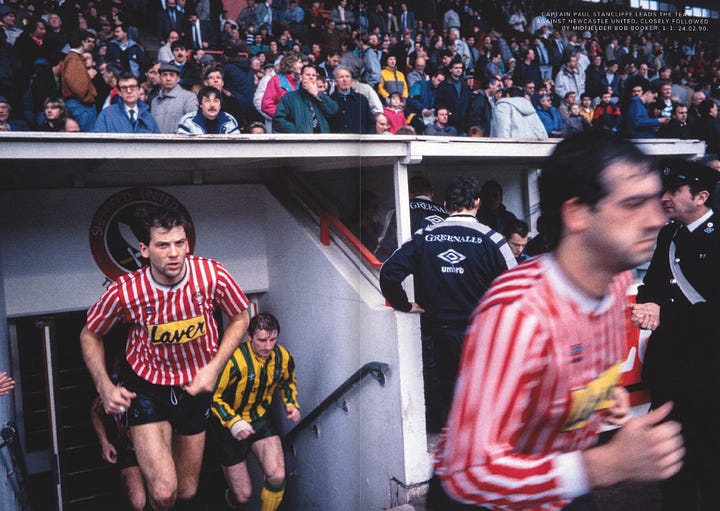
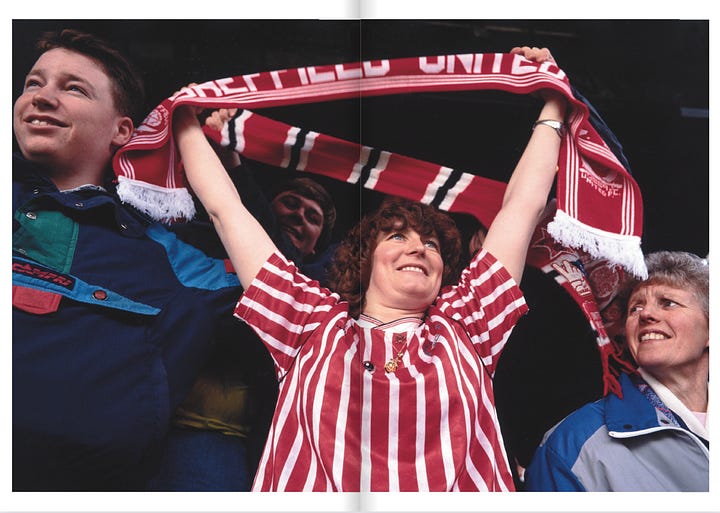



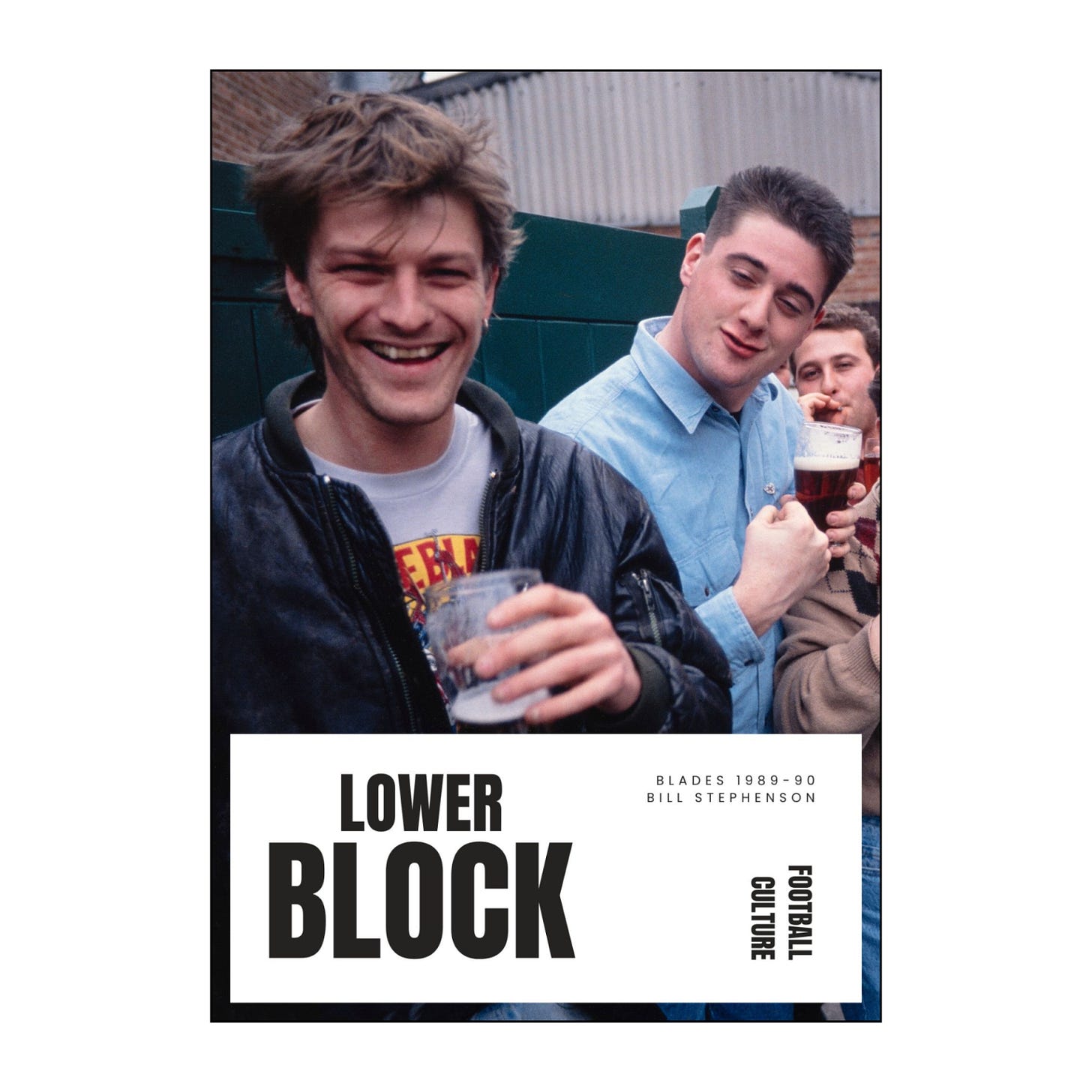
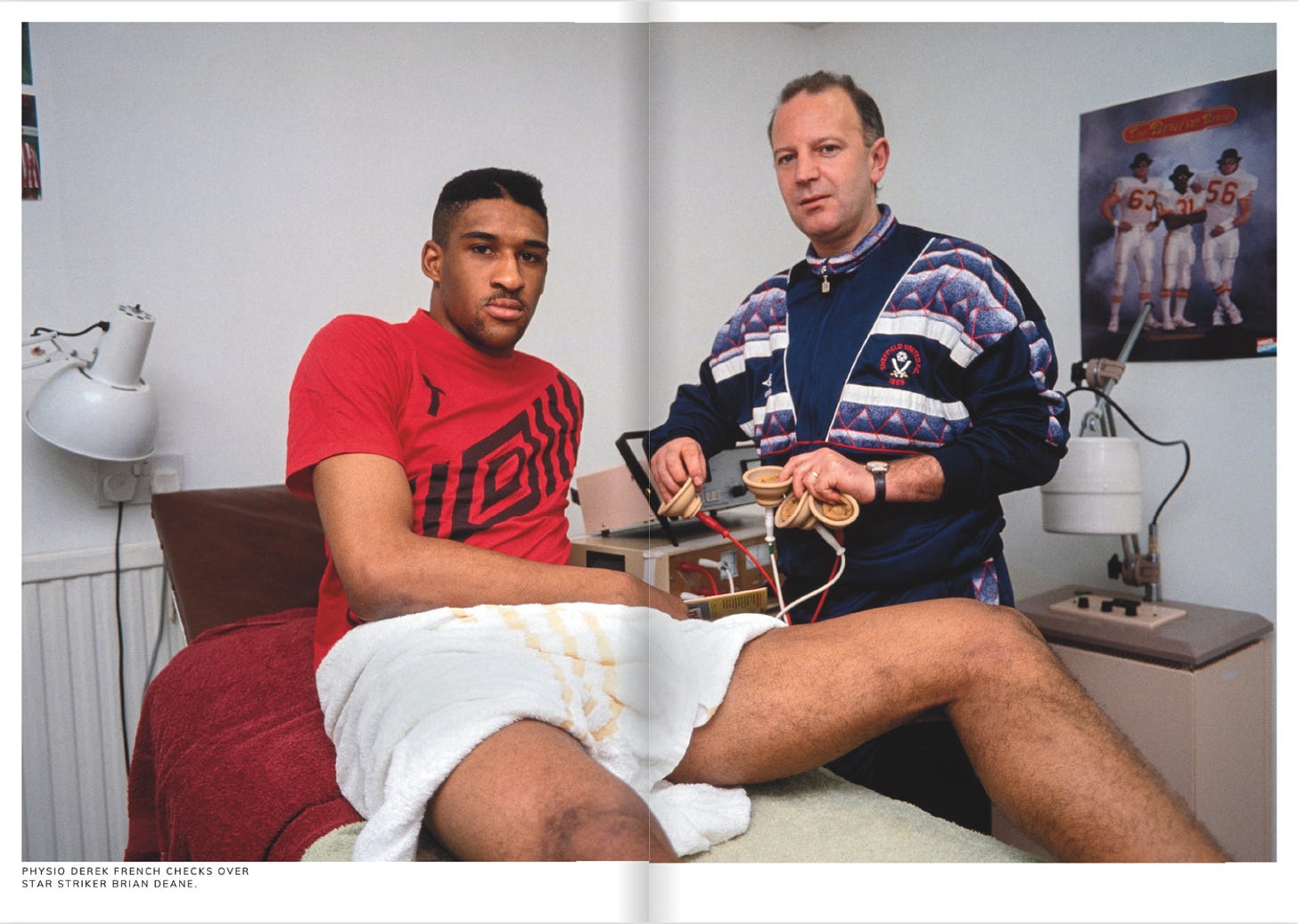
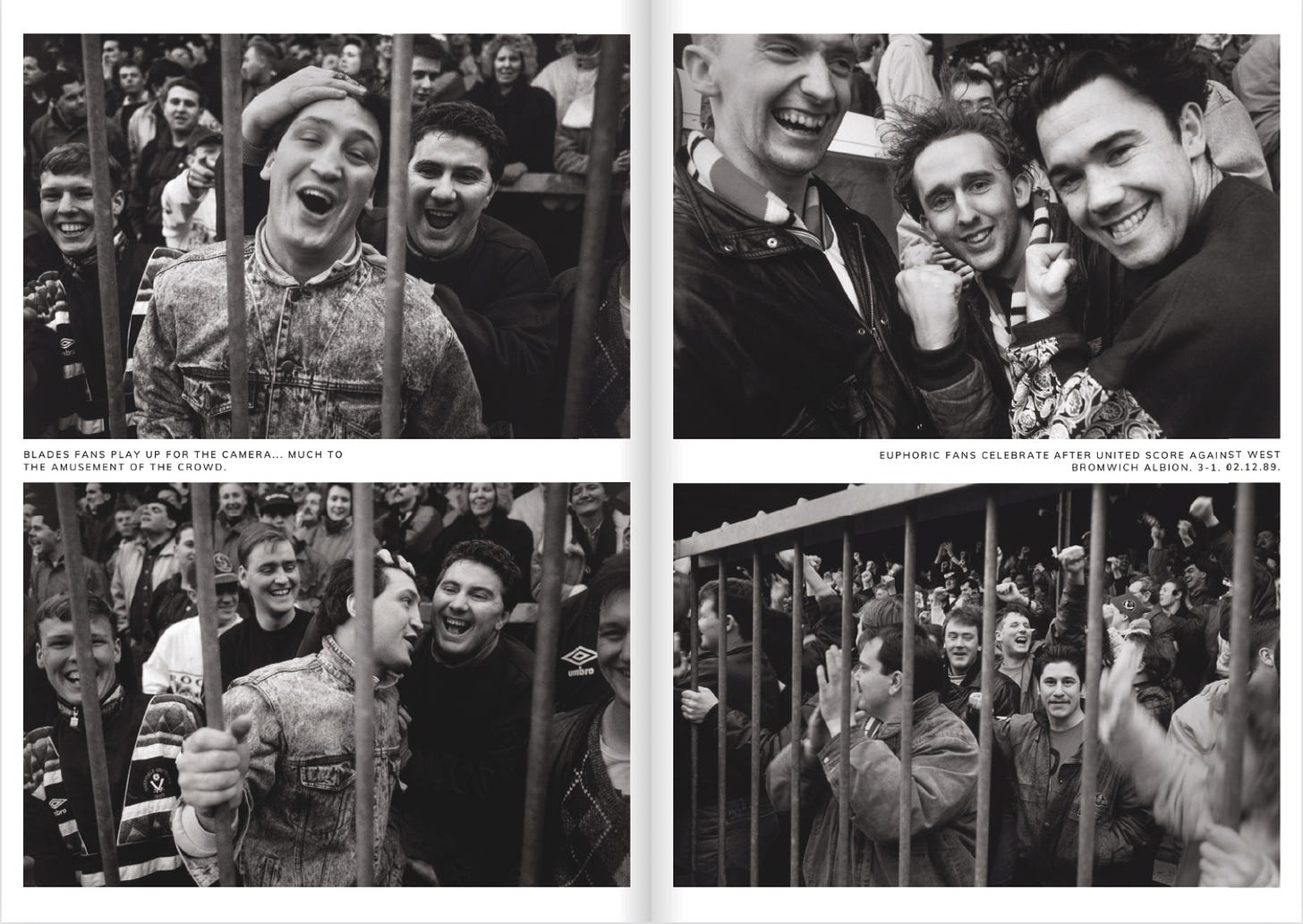
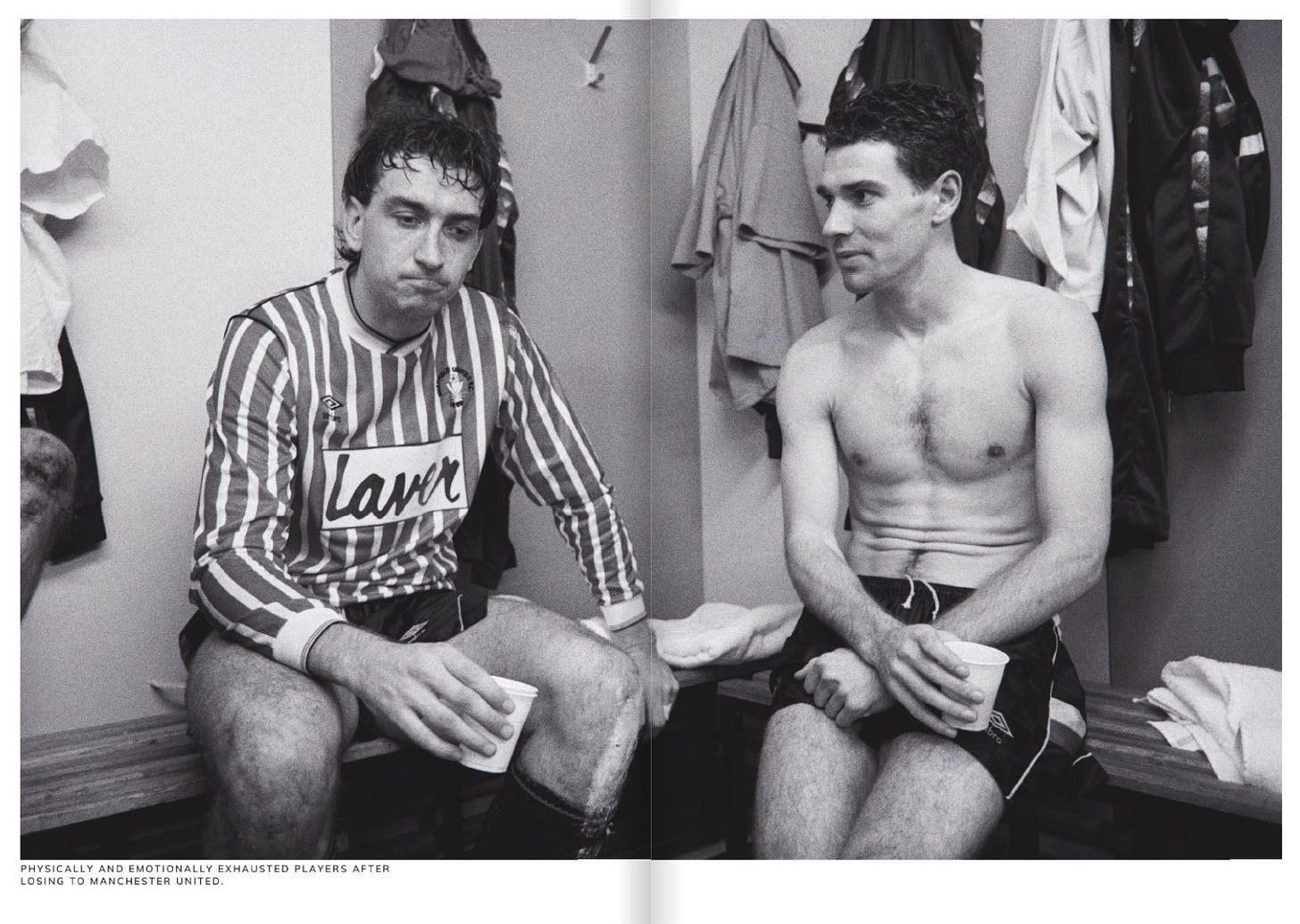
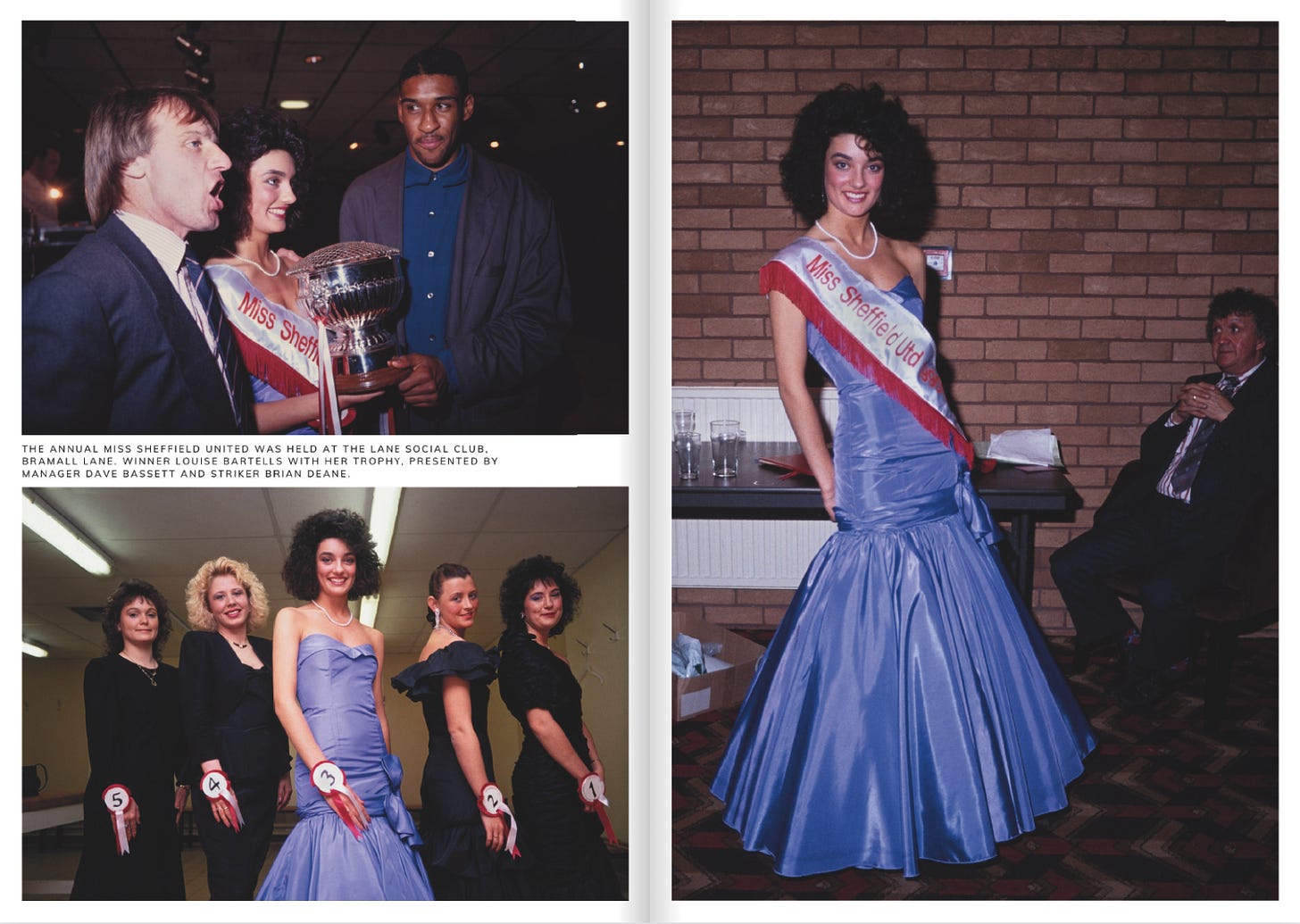
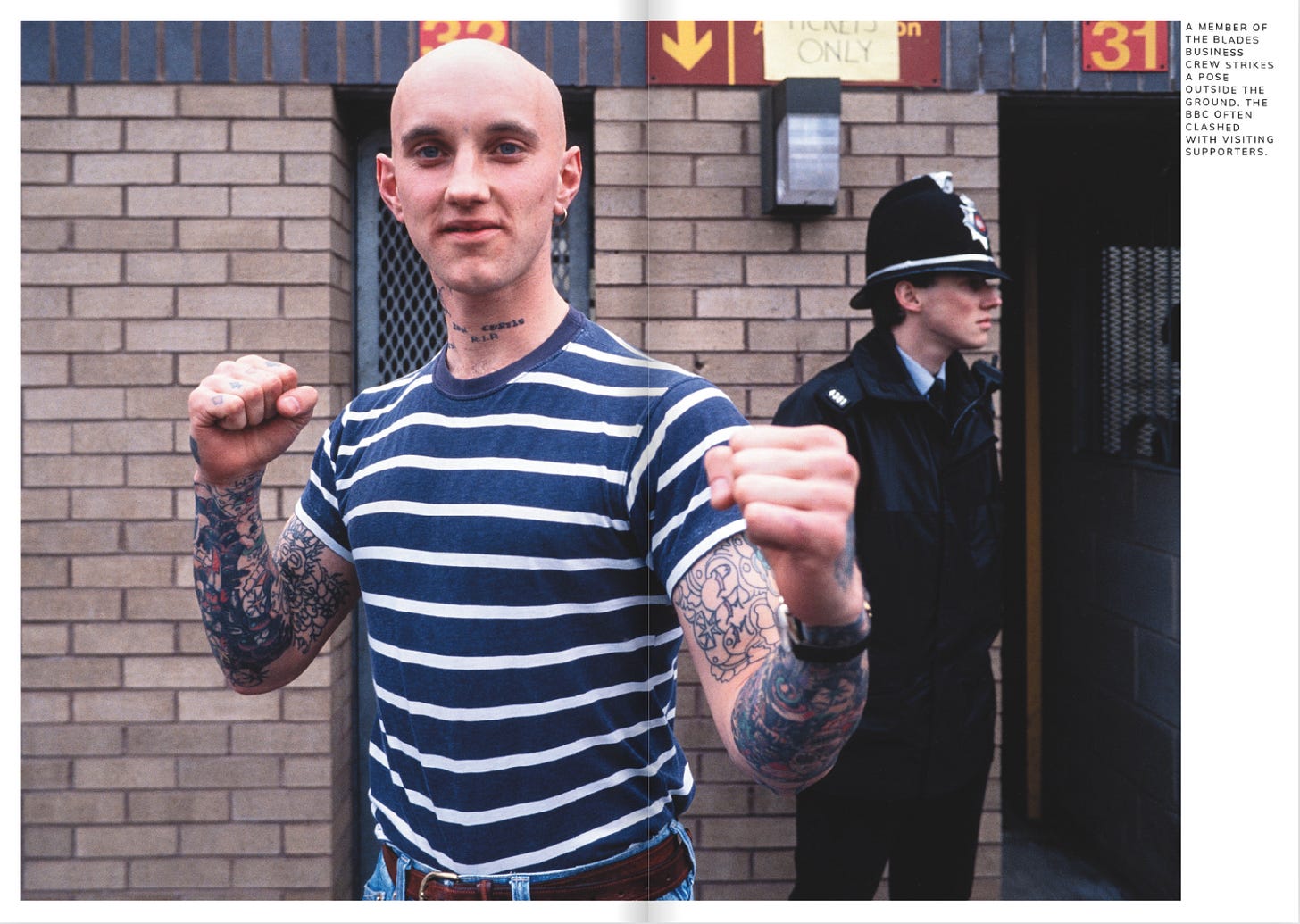
My Mum worked at Bramall Lane whilst the BBC film crew were there. She died last year and when we were going through all her papers we found a lovely letter from one of the production team saying how grateful she was for all mums help during the time they were there.
Lovely memories.
We actually went on the coach to Bradford, which included Sean Bean , his wife at the time Melanie Hill and the BBC crew. Great times.
Thanks, David – a great showcase of what promises to be a really worthwhile book.
“All these photo documentaries are always concerned with recording the society that we live in today, or at a point in time. As time goes by, pictures like these become historic records.”
Absolutely.
What a great honour for Mr Stephenson to have been able to chronicle that year – from players’, manager’s and fans’ perspectives.
(And a few chilling pre-Hillsborough photographs of being behind bars, too! Amazing to think that was the norm then . . .)
Sue.